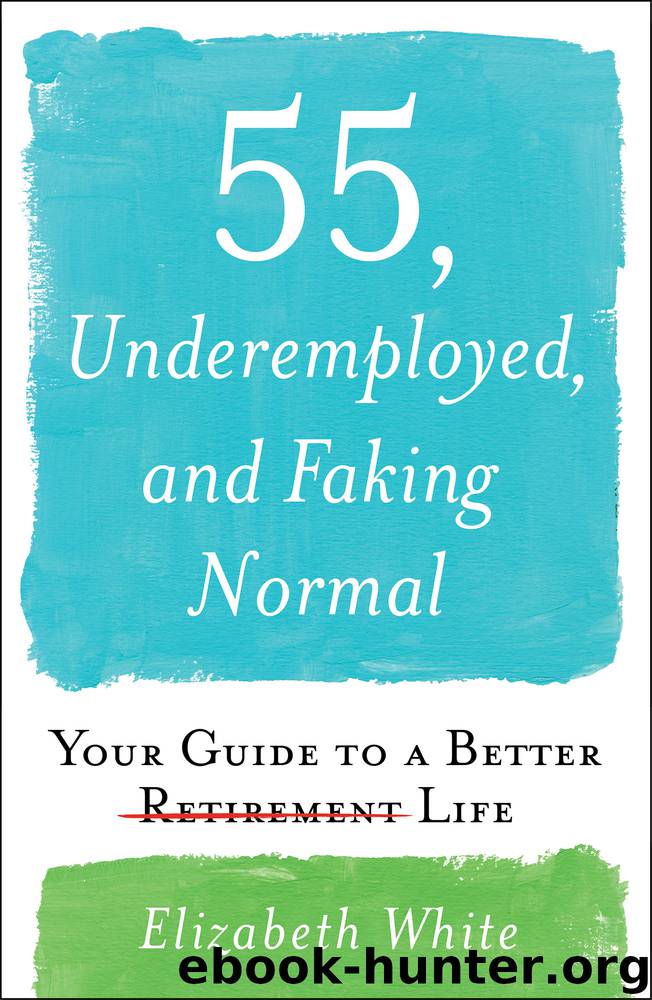55, Underemployed, and Faking Normal by Elizabeth White

Author:Elizabeth White
Language: eng
Format: epub
Publisher: Simon & Schuster
Our Shared Economy, or the Sharing-the-Crumbs Economy
Critics have a lot to say about the negatives of independent work defined as contract, contingent, part-time/temporary, and freelance jobs.6 The concerns are real and are probably well known to you if you’ve participated in the sharing economy for any length of time.
As a contractor, you generally get no benefits and are responsible for covering your own expenses. There’s no health insurance, and you’re on your own with social security because your employer is not required to make social security (or Medicare) contributions. And in most cases you’re not eligible for unemployment insurance benefits when your contract ends. Forget, too, about labor protections like minimum wage, overtime, and workers’ compensation. And because these independent jobs are uncertain and unreliable, there’s no income stability.
I’m a graphic designer but have done a little of everything to try to stay afloat: I’ve been a clothing store cashier and a babysitter. At fifty-nine, I support myself with freelance gigs, but the money is unreliable. I apply for twenty-five or thirty jobs a week but rarely hear back. When I do make it to the interview stage, I’m told that I’m not a good “culture fit.” I am up on all the latest technology and social media but look like a middle-aged mom. To the thirty-somethings, I don’t look like I can do cutting-edge design. In December someone hit my car, and I used the $1,500 insurance money to pay my mortgage.
—Quinn
It won’t surprise you that the debate rages on about whether the shared economy is good—bringing freedom, choices, and much-needed employment to millions of people—or bad—degrading labor standards, evading regulations, and creating a nation of low-wage, part-time workers. And the debate and its ramifications are not taking place just in the United States.
In Paris, homeowners must be registered with the government and can only rent their homes a maximum of 120 days per year. Last year, authorities cracked down on illegal Airbnb vacation rentals and threatening to remove some 43,000 unregistered homes, 80 percent of Airbnb’s Paris rentals, from the space-sharing site.7
In Madrid, proposed legislation would limit Airbnb rentals to ninety days per year.8 In Berlin, authorities, citing the need to protect affordable housing, banned Airbnb rentals to tourists. Restrictions have been eased recently, but steep fines remain for noncompliance with new rules.9
Uber, too, continues to face obstacles with local governments and regulators. It recently lost big when Europe’s top court classified the ride-hailing service as a transport rather than a technology company and, as such, subjected to the same regulations governing the traditional taxi cab industry.10 Rulings like this have already forced Uber to restrict or suspend operations in multiple locations, including Finland, France, Germany, Hungary, Spain, and the Netherlands.11
Whether we like it or not, the sharing economy is here to stay. Just as we boomers are entering our endgames, all of the work rules are changing. We don’t romanticize the sharing economy. We know that we pay a high price for the “freedom and choice” of uncertain work.
Download
This site does not store any files on its server. We only index and link to content provided by other sites. Please contact the content providers to delete copyright contents if any and email us, we'll remove relevant links or contents immediately.
| Budgeting & Money Management | College & Education Costs |
| Credit Ratings & Repair | Retirement Planning |
The Compound Effect by Darren Hardy(7571)
Tools of Titans by Timothy Ferriss(6955)
Nudge - Improving Decisions about Health, Wealth, and Happiness by Thaler Sunstein(6638)
Win Bigly by Scott Adams(6322)
Pioneering Portfolio Management by David F. Swensen(5610)
Deep Work by Cal Newport(5484)
Principles: Life and Work by Ray Dalio(5327)
The Barefoot Investor by Scott Pape(5311)
Rich Dad Poor Dad by Robert T. Kiyosaki(5156)
Grit by Angela Duckworth(4742)
The Slight Edge by Jeff Olson(4725)
Discipline Equals Freedom by Jocko Willink(4641)
Digital Minimalism by Cal Newport;(4557)
The Motivation Myth by Jeff Haden(4532)
You Are a Badass at Making Money by Jen Sincero(4257)
The Four Tendencies by Gretchen Rubin(4027)
The Confidence Code by Katty Kay(3572)
Eat That Frog! by Brian Tracy(3521)
Captivate by Vanessa Van Edwards(3302)
